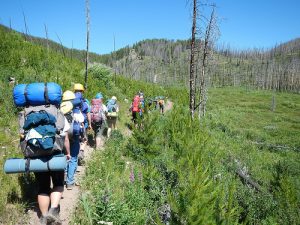Wilderness Therapy Helps Heal Body Perceptions, Increase Life Skills
 Adventure-based therapy, or wilderness therapy, is an established treatment option for people with eating disorders.
Adventure-based therapy, or wilderness therapy, is an established treatment option for people with eating disorders.
It is usually given in addition to standard treatments such as cognitive behavioral therapy. ABT is a regular feature of some eating-disorder treatment programs.
An ABT outing can last one day or several. Groups may go cave crawling, canoeing, or hiking. They might camp in a desert or forest. Any activity that involves nature and stepping out of one’s comfort zone is a possibility.
Purpose and Pluses of ABT
ABT is meant to provide an unusual, interesting, emotionally and physically challenging environment where people must exercise coping strategies and problem-solving skills. Because ABT is typically a group event, it also facilitates development of communication skills and social self-confidence.
Adventure-based therapy:
- Combines physical, practical experience with self-reflection.
- Encourages participants to take an active role in their therapeutic process, working in partnership with the therapist(s).
- Provides opportunities to experiment with and develop new coping skills and social behaviors.
- Encourages both self-reliance and healthy human interdependence.
- Involves reasonable risk-taking that facilitates change.
- Emphasizes solutions and progress instead of dysfunctional habits and problems.
Effectiveness of ABT
Research on the effectiveness of ABT is scarce, and the studies are generally small. However, study outcomes and participant feedback, from both therapists and patients, suggest this type of therapy provides valuable benefits.
Research outcomes and participant surveys indicate:
- ABT helps participants in areas of coping skills, perfectionism, self-esteem, body satisfaction, and obsessions with thinness and appearance.
- The experiential nature of ABT promotes increased trust in the self and in others, and helps participants recognize their personal values.
- Participants learn the benefit of asking for help, gain awareness and appreciation for their own strengths, and learn to enjoy the journey instead of concentrating on the destination.
- Using the body to help and support others allows some individuals feel connected to their body for the first time in years.
- Adventures in nature help some people reconnect with their spontaneous emotional reactions to experience.
Possible Disadvantages of ABT
As with other therapies, not everyone can or will benefit from ABT. Although some programs gear their outdoor adventures to the physical capacities of the participants, some individuals with an eating disorder may be physically unable to participate in ABT or may have their activity levels limited by a doctor.
It is also possible that the lessons learned during ABT will be lost if they are not implemented and reinforced after the ABT experience. This could happen, for instance, if insurance coverage ends someone’s treatment before its effect has taken hold.
To find ABT opportunities, Google “adventure based therapy programs.”
Sources: U of Wisconsin LaCrosse; Mirasol
 Eating Disorder Self Test. Take the EAT-26 self test to see if you might have eating disorder symptoms that might require professional evaluation. All answers are confidential.
Eating Disorder Self Test. Take the EAT-26 self test to see if you might have eating disorder symptoms that might require professional evaluation. All answers are confidential.